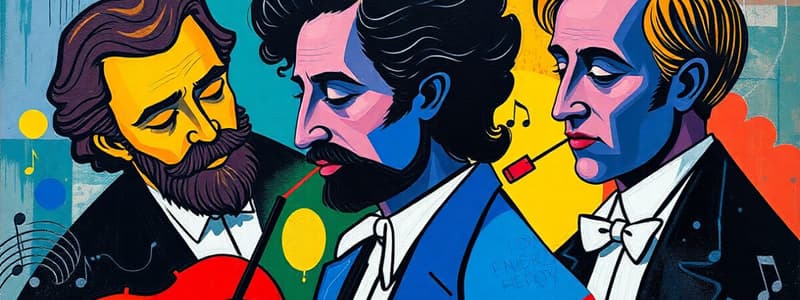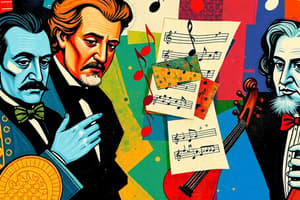Podcast
Questions and Answers
Which composer's work is most directly influenced by the physical landscape and climate of their home country?
Which composer's work is most directly influenced by the physical landscape and climate of their home country?
- Steve Reich
- Arvo Pärt
- John Adams
- Hildur Guðnadóttir (correct)
A composer is creating a piece that uses speech recordings and repetitive instrumental phrases that gradually shift out of sync. Which composer's techniques are they most likely emulating?
A composer is creating a piece that uses speech recordings and repetitive instrumental phrases that gradually shift out of sync. Which composer's techniques are they most likely emulating?
- Julia Wolfe
- Steve Reich (correct)
- Kevin Volans
- Kaija Saariaho
If a composer aims to combine minimalist techniques with a sense of humor and rhythmic drive while referencing current events, which composer's style aligns best with this approach?
If a composer aims to combine minimalist techniques with a sense of humor and rhythmic drive while referencing current events, which composer's style aligns best with this approach?
- Hildur Guðnadóttir
- John Adams (correct)
- Kevin Volans
- Arvo Pärt
A composer is creating a new work that combines traditional instruments with synthesized electronic sounds to create a dramatic and somewhat unsettling atmosphere. Which of the following composers has explored similar techniques?
A composer is creating a new work that combines traditional instruments with synthesized electronic sounds to create a dramatic and somewhat unsettling atmosphere. Which of the following composers has explored similar techniques?
Which composer, after initially being influenced by Stockhausen, integrated African rhythms and techniques into their compositional style?
Which composer, after initially being influenced by Stockhausen, integrated African rhythms and techniques into their compositional style?
Which composer is known for pioneering 'free music' with elastic scorings, allowing compositions to be played by any instrument?
Which composer is known for pioneering 'free music' with elastic scorings, allowing compositions to be played by any instrument?
How did Igor Stravinsky, Charles Ives, and Béla Bartók contribute to the evolution of modern classical music?
How did Igor Stravinsky, Charles Ives, and Béla Bartók contribute to the evolution of modern classical music?
Which composer incorporated an early electronic instrument, the ondes Martenot, into their orchestral works?
Which composer incorporated an early electronic instrument, the ondes Martenot, into their orchestral works?
What is the significance of Terry Riley's In C (1964) in the context of modern classical music?
What is the significance of Terry Riley's In C (1964) in the context of modern classical music?
What was a distinctive characteristic of Paul Hindemith's compositional style?
What was a distinctive characteristic of Paul Hindemith's compositional style?
How did Luciano Berio incorporate national elements into his compositions?
How did Luciano Berio incorporate national elements into his compositions?
What was the primary focus of Gyorgy Ligeti's orchestral experiments?
What was the primary focus of Gyorgy Ligeti's orchestral experiments?
How did Tõru Takemitsu blend national and Western musical traditions?
How did Tõru Takemitsu blend national and Western musical traditions?
Flashcards
Hildur Guðnadóttir
Hildur Guðnadóttir
Icelandic composer known for exploring dark themes inspired by Iceland's landscape; won an Oscar for the Joker score.
Arvo Pärt
Arvo Pärt
Estonian composer who uses minimalist techniques to create poetic and religious music.
Steve Reich
Steve Reich
Composer known for phase-shifting music using tape loops and speech recordings at slightly different speeds.
John Adams
John Adams
Signup and view all the flashcards
Kaija Saariaho
Kaija Saariaho
Signup and view all the flashcards
Atonal Music
Atonal Music
Signup and view all the flashcards
Polytonal Music
Polytonal Music
Signup and view all the flashcards
Chance Music
Chance Music
Signup and view all the flashcards
Paul Hindemith's Style
Paul Hindemith's Style
Signup and view all the flashcards
Free Music
Free Music
Signup and view all the flashcards
Minimalist Music
Minimalist Music
Signup and view all the flashcards
Graphic Score
Graphic Score
Signup and view all the flashcards
Toru Takemitsu's Style
Toru Takemitsu's Style
Signup and view all the flashcards
Study Notes
- Modern classical music has taken many directions and split into varied styles.
- Composers have experimented with harmonies, melodies, and rhythms, sometimes combining many at the same time or removing them completely.
- The use of electronic instruments and computer technology has opened up musical possibilities.
Paul Hindemith (1895–1963)
- Modernized music in an inventive and witty way.
- Mixed 1920s jazz style with classical forms and Bach-style baroque music.
Dmitri Shostakovich (1906–1975)
- Was criticized for composing "discordant and confused" music.
- Combined different trends including tonal and atonal music, and romance with violent emotion.
Percy Grainger (1882-1961)
- Pioneered the idea of "free music" by experimenting with random, gliding music where there's no set rhythm or pitch.
- Devised elastic scoring, meaning that a work could be played by any instrument.
Olivier Messiaen (1908-1992)
- Featured an early electronic instrument, the ondes Martenot with its trembling swooping sound.
- The instrument was featured in his Turangalila-Symphonie in 1948.
Igor Stravinsky, Charles Ives, and Béla Bartók
- Developed polytonal music; different parts played at the same time in different keys.
John Cage (1912-1992)
- Developed the idea of music happening by chance.
- Created 4'33", a piece of silence where any "chance" noises during its performance became part of the work.
Terry Riley
- In 1964 created In C, where any number of instrumentalists repeated a short phrase over and over at different times before moving on to the next phrase at some point
- Other composers, such as Philip Glass and La Monte Young, developed this slowly shifting minimalist music.
Karlheinz Stockhausen
- In the 1950s and 1960s, broke new ground in electronic music by manipulating the playback of tape recordings through loudspeakers.
György Ligeti
- Experimented with creating a new shifting orchestral sound without a clear melody.
Pierre Boulez
- In the 1970s, the French composer founded an institution for music research and experimentation called IRCAM (Institut de Recherche et Coordination Acoustique/Musique).
Iannis Xenakis
- The Greek composer was interested in the mathematics of music, and also used computer programs to create compositions.
Luciano Berio (1925-2003)
- Working at IRCAM in the 1970s, he studied speech patterns and applied this to music.
- His compositions are also inspired by Sicilian folk music.
Tõru Takemitsu (1930-1996)
- Combined traditional Japanese scales and instruments with Western styles and orchestra, creating interesting harmonies.
Hildur Guðnadóttir (1982-)
- Explores dark themes in her compositions and is greatly inspired by Iceland's landscape and its long, dark winters.
- Won an Oscar in 2020 for the musical score of the Hollywood film Joker.
Arvo Pärt (1935–)
- Experiments with minimalist orchestral techniques to convey poetic sounds in his religious music.
Steve Reich (1936–)
- Inspired by tape-loops and speech recordings, creates rippling, phase-shifting music where the instruments steadily play at slightly different speeds.
John Adams (1947–)
- Applies a lively sense of humor and rhythmic excitement to minimalism.
- Writes pieces based on world headlines and major events.
Kevin Volans (1949-)
- After working with Stockhausen, this South African composer combined rhythms and techniques from African music with his own style.
Kaija Saariaho (1952-)
- Experiments with a combination of synthesized electronic and instrumental sounds to produce dramatic and mysterious new music.
Julia Wolfe (1958-)
- Includes many modern music influences in her classical compositions.
- Her 2002 composition Dark Full Ride is written for four drum kits.
Studying That Suits You
Use AI to generate personalized quizzes and flashcards to suit your learning preferences.




